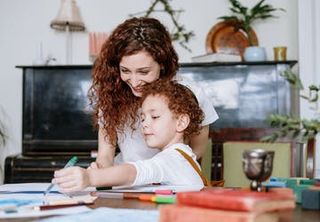Parenting
Positive Parenting During the Pandemic
How to minimize misbehavior and keep parent-child interactions running smoothly.
Posted April 15, 2020 Reviewed by Gary Drevitch

Parents today are faced with a challenge unlike any that has been seen during modern times. For families around the world, the transition to sheltering-at-home has been an abrupt departure from their usual schedules and routines. Keeping the family healthy, keeping young children occupied with child care centers closed, and keeping older children and adolescents learning with schools closed are among the numerous challenges facing parents. Such stresses, compounded with financial strains, boredom, and social isolation, make caring for a family much more difficult.
With no immediate end in sight for the pandemic and social distancing, what can parents do to try to minimize misbehavior and keep parent-child interactions running smoothly?
To prevent children from misbehaving in the first place and avoid reactive discipline after the misbehavior has occurred, parents can be proactive in trying to set the stage for smooth interactions. Part of being proactive can include being clear with children about expectations for good behavior, and defining exactly what “good behavior” is, which will depend on the child’s age.
For example, instead of saying to a preschooler, “Be good while I’m on this work call,” a parent can be more specific: "I will be on this work call for half an hour—you can see the timer count down the numbers. During that time, please be as quiet as a mouse and do not come into the room with me. Instead, I’d like you to color, play with your cars, and eat your snack. When I’m finished with the call we’ll play a game together.” Then be sure to follow through with the promised game and praise for good behavior during the call.
Even with proactive parenting, though, children will misbehave sometimes. What then?
For infants and toddlers, distraction is often the best approach. If a toddler is getting into something he shouldn’t, simply move the tempting object or give the toddler something else to do. No physical force is needed.
For preschoolers, time outs (both for the child and the parent) can be a good way to deescalate the situation and give both the child and parent time to gain control over emotions so they can move forward without lashing out at one another.
For school-age children and adolescents, removing privileges such as a phone or video game system can be an effective form of discipline in ordinary times, but when so many privileges have been removed already by virtue of having to stay confined at home, finding additional privileges to remove can be too harsh for children and adolescents, as well as for parents who might then struggle to find alternative ways to keep them occupied. Instead, parents could try alternatives that fit the child’s infraction, such as writing a letter of apology for being mean to a sibling or disrespectful to a parent.
When distraction, time-outs, removing privileges, and other non-physical consequences fail, parents sometimes resort to spanking, slapping, whooping, or other forms of punishment in which parents inflict pain on children. It is important to avoid all forms of corporal punishment. When parents use corporal punishment, they often are lashing out in anger or frustration because a child is disobedient. If an initial swat does not get the child to do as she has been told, however, a coercive cycle can develop in which the parent uses more force and the child resists even more.
At best, this dangerous pattern ends when either the parent or child backs down (teaching the other that destructive behavior can pay off in the end); at worst, it ends in injury to the child. Avoiding corporal punishment in the first place is the best way to protect children from physical abuse, as well as the emotional trauma that often accompanies it.
In many stressful situations, the best predictor of how children fare is how their parents fare. If parents’ stress spills over into harsh interactions with their children, children’s emotions and behaviors will be worse than if parents are able to maintain calm, consistent interactions with them. So, to keep children and adolescents safe at home during the COVID-19 pandemic, or really at any time, avoid corporal punishment, use alternate discipline strategies, and be as proactive as possible to prevent misbehavior in the first place.


